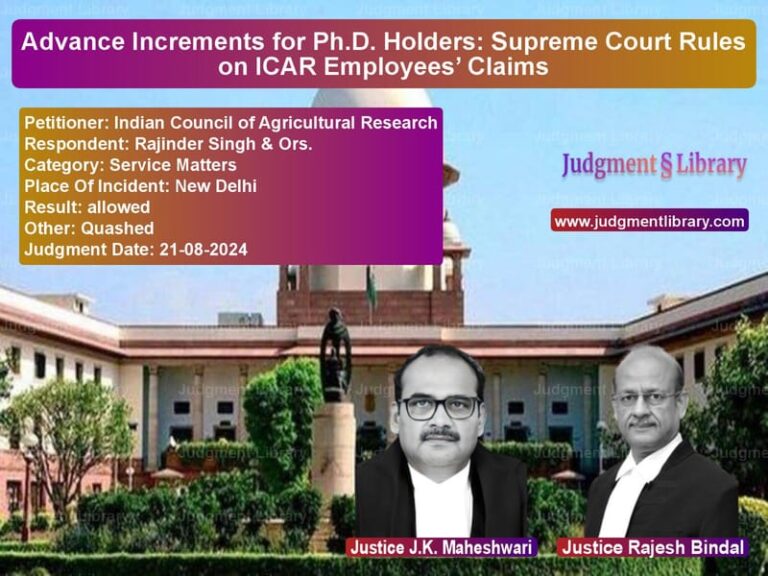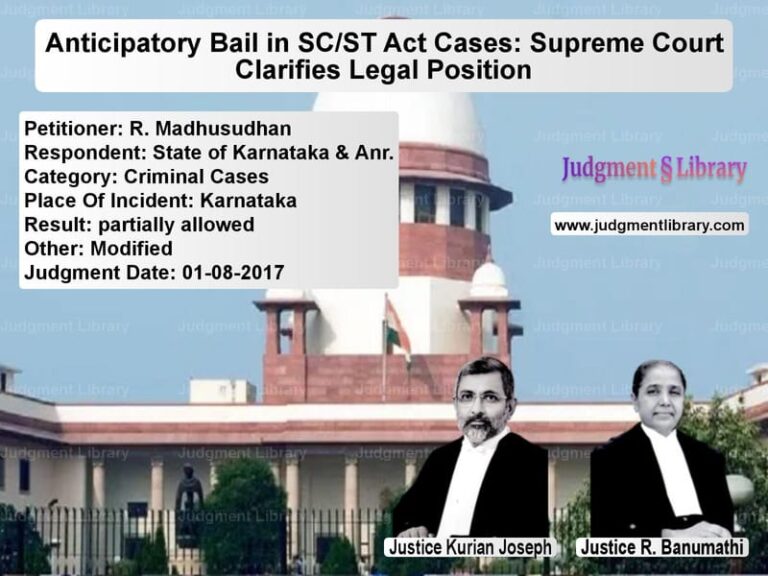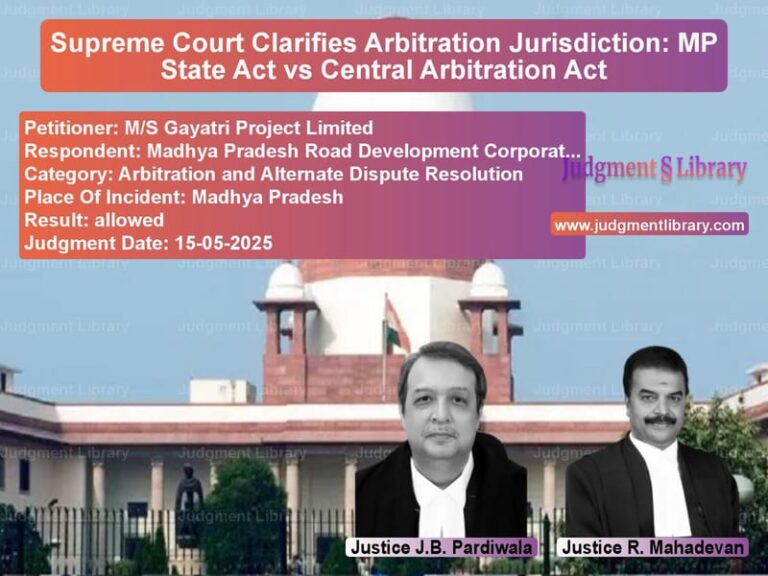High Security Registration Plates: Supreme Court’s Ruling on Contempt and Implementation Issues
The case of Maninderjit Singh Bitta vs. Vijay Chhibber & Ors. revolves around the non-implementation of the High Security Registration Plates (HSRP) scheme despite repeated directives from the Supreme Court. This contempt petition was filed by Maninderjit Singh Bitta, who alleged that various government officials failed to enforce the scheme, thereby violating previous Supreme Court orders.
The judgment delves into the origins of the HSRP scheme, its significance in preventing vehicle-related crimes, and the repeated failure of authorities to comply with the orders. While the Supreme Court refrained from initiating contempt proceedings, it issued strict guidelines for the effective implementation of the scheme.
Background of the Case
The need for High Security Registration Plates arose after the 2002 terrorist attack on the Indian Parliament, where vehicles were used for nefarious activities. To curb vehicle thefts and their misuse in crimes like kidnapping, dacoity, and terrorism, the Government of India introduced the HSRP scheme. Rule 50 of the Central Motor Vehicles Rules, 1989, was amended to include stringent requirements for registration plates.
Despite these measures, the implementation of the scheme remained poor, leading to a series of litigations. In Association of Registration Plates vs. Union of India (2005), the Supreme Court upheld the validity of the HSRP scheme and issued directives for its execution. However, even after multiple orders, the compliance remained dismal, prompting the petitioner to initiate contempt proceedings.
Key Legal Issues Considered
- Was there willful disobedience of Supreme Court orders regarding HSRP implementation?
- Should contempt proceedings be initiated against government officials for non-compliance?
- What further directives should be issued to ensure implementation?
Arguments from Both Sides
Petitioner’s Arguments
Maninderjit Singh Bitta contended:
- “Despite clear Supreme Court orders, the government has failed to enforce the HSRP scheme.”
- “Unauthorized subcontracting of HSRP manufacturing violates the guidelines and poses security risks.”
- “M/s. Utsav Safety Systems Pvt. Ltd. and its consortium partners engaged in illegal outsourcing of plate manufacturing.”
- “State governments have not taken action against violators, rendering the security initiative ineffective.”
Respondents’ Arguments
The respondents, including government officials, countered:
- “Rule 50 of the CMV Rules does not explicitly prohibit job work or subcontracting.”
- “The government has taken necessary steps, but the scale of implementation requires more time.”
- “Strict action has been taken against certain violators, including the termination of agreements.”
Supreme Court’s Judgment
The Supreme Court acknowledged the lapses but opted against contempt proceedings, stating:
- “While there is prima facie violation of Rule 50 of CMV Rules, we refrain from initiating contempt proceedings.”
- “M/s. Utsav has provided an undertaking that no outsourcing of blank plate manufacturing will be done in the future.”
- “State governments must ensure full compliance with HSRP regulations.”
Guidelines Issued by the Supreme Court
The Court laid down comprehensive guidelines for the strict implementation of the HSRP scheme:
- Strict Adherence to Rule 50: All states must ensure compliance with Rule 50 of the CMV Rules.
- Transparent Tender Process: The selection of HSRP manufacturers must be based on financial and technical competence.
- Ban on Outsourcing: Authorized manufacturers cannot subcontract the blank plate manufacturing process.
- Regular Audits: Testing agencies must conduct periodic inspections to ensure compliance with safety and quality standards.
- State-Level Monitoring: Transport authorities must oversee HSRP implementation and take action against violators.
- Database Integration: A nationwide repository for vehicle registration data must be created for better tracking.
Impact of the Judgment
This ruling has significant implications:
- It reinforces that compliance with HSRP regulations is mandatory.
- It holds government authorities accountable for implementation failures.
- It ensures that HSRP manufacturing and distribution remain within security guidelines.
- It sets a precedent for future litigation concerning vehicle security and law enforcement.
Conclusion
The Supreme Court’s decision in this case serves as a crucial step toward ensuring the effective implementation of the HSRP scheme. By issuing strict guidelines and emphasizing accountability, the Court aims to bridge the gap between policy and execution. The ruling underscores that national security measures like HSRP cannot be compromised due to administrative negligence.
Don’t miss out on the full details! Download the complete judgment in PDF format below and gain valuable insights instantly!
Download Judgment: Maninderjit Singh Bi vs Vijay Chhibber & Ors Supreme Court of India Judgment Dated 13-07-2016-1741873190403.pdf
Direct Downlaod Judgment: Direct downlaod this Judgment
See all petitions in Public Interest Litigation
See all petitions in Legislative Powers
See all petitions in Judgment by T.S. Thakur
See all petitions in Judgment by R K Agrawal
See all petitions in Judgment by R. Banumathi
See all petitions in dismissed
See all petitions in supreme court of India judgments July 2016
See all petitions in 2016 judgments
See all posts in Constitutional Cases Category
See all allowed petitions in Constitutional Cases Category
See all Dismissed petitions in Constitutional Cases Category
See all partially allowed petitions in Constitutional Cases Category







